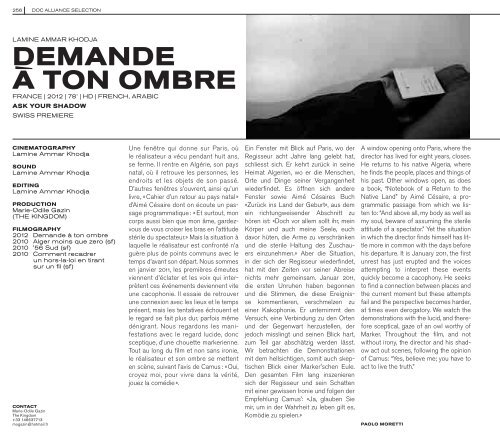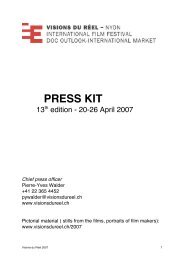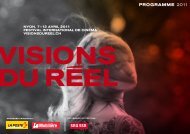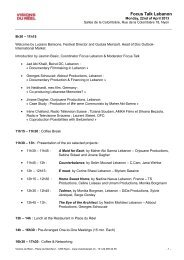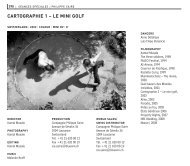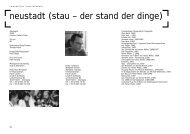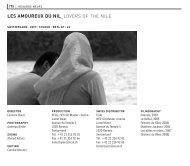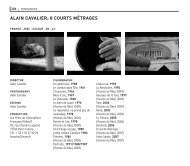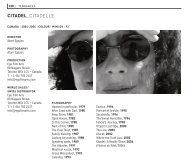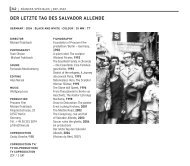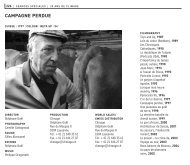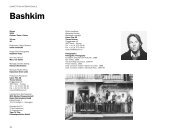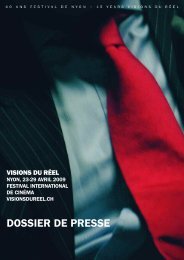Katalog 2013.pdf - Visions du Réel
Katalog 2013.pdf - Visions du Réel
Katalog 2013.pdf - Visions du Réel
You also want an ePaper? Increase the reach of your titles
YUMPU automatically turns print PDFs into web optimized ePapers that Google loves.
256 doc alliance Selection<br />
Lamine Ammar Khodja<br />
Demande<br />
à ton ombre<br />
France | 2012 | 78’ | HD | French, Arabic<br />
Ask your Shadow<br />
Swiss Premiere<br />
Cinematography<br />
Lamine Ammar Khodja<br />
Sound<br />
Lamine Ammar Khodja<br />
Editing<br />
Lamine Ammar Khodja<br />
Pro<strong>du</strong>ction<br />
Marie-Odile Gazin<br />
(THE KINGDOM)<br />
Filmography<br />
2012 Demande à ton ombre<br />
2010 Alger moins que zero (sf)<br />
2010 '56 Sud (sf)<br />
2010 Comment recadrer<br />
un hors-la-loi en tirant<br />
sur un fil (sf)<br />
Contact<br />
Marie-Odile Gazin<br />
The Kingdom<br />
+33 146637713<br />
mogazin@hotmail.fr<br />
Une fenêtre qui donne sur Paris, où<br />
le réalisateur a vécu pendant huit ans,<br />
se ferme. Il rentre en Algérie, son pays<br />
natal, où il retrouve les personnes, les<br />
endroits et les objets de son passé.<br />
D’autres fenêtres s’ouvrent, ainsi qu’un<br />
livre, « Cahier d’un retour au pays natal »<br />
d’Aimé Césaire dont on écoute un passage<br />
programmatique : « Et surtout, mon<br />
corps aussi bien que mon âme, gardezvous<br />
de vous croiser les bras en l’attitude<br />
stérile <strong>du</strong> spectateur.» Mais la situation à<br />
laquelle le réalisateur est confronté n’a<br />
guère plus de points communs avec le<br />
temps d’avant son départ. Nous sommes<br />
en janvier 2011, les premières émeutes<br />
viennent d’éclater et les voix qui interprètent<br />
ces événements deviennent vite<br />
une cacophonie. Il essaie de retrouver<br />
une connexion avec les lieux et le temps<br />
présent, mais les tentatives échouent et<br />
le regard se fait plus <strong>du</strong>r, parfois même<br />
dénigrant. Nous regardons les manifestations<br />
avec le regard lucide, donc<br />
sceptique, d’une chouette markerienne.<br />
Tout au long <strong>du</strong> film et non sans ironie,<br />
le réalisateur et son ombre se mettent<br />
en scène, suivant l’avis de Camus : « Oui,<br />
croyez moi, pour vivre dans la vérité,<br />
jouez la comédie ».<br />
Ein Fenster mit Blick auf Paris, wo der<br />
Regisseur acht Jahre lang gelebt hat,<br />
schliesst sich. Er kehrt zurück in seine<br />
Heimat Algerien, wo er die Menschen,<br />
Orte und Dinge seiner Vergangenheit<br />
wiederfindet. Es öffnen sich andere<br />
Fenster sowie Aimé Césaires Buch<br />
«Zurück ins Land der Geburt», aus dem<br />
ein richtungweisender Abschnitt zu<br />
hören ist: «Doch vor allem sollt ihr, mein<br />
Körper und auch meine Seele, euch<br />
davor hüten, die Arme zu verschränken<br />
und die sterile Haltung des Zuschauers<br />
einzunehmen.» Aber die Situation,<br />
in der sich der Regisseur wiederfindet,<br />
hat mit den Zeiten vor seiner Abreise<br />
nichts mehr gemeinsam. Januar 2011,<br />
die ersten Unruhen haben begonnen<br />
und die Stimmen, die diese Ereignisse<br />
kommentieren, verschmelzen zu<br />
einer Kakophonie. Er unternimmt den<br />
Versuch, eine Verbin<strong>du</strong>ng zu den Orten<br />
und der Gegenwart herzustellen, der<br />
jedoch misslingt und seinen Blick hart,<br />
zum Teil gar abschätzig werden lässt.<br />
Wir betrachten die Demonstrationen<br />
mit dem hellsichtigen, somit auch skeptischen<br />
Blick einer Marker'schen Eule.<br />
Den gesamten Film lang inszenieren<br />
sich der Regisseur und sein Schatten<br />
mit einer gewissen Ironie und folgen der<br />
Empfehlung Camus’: «Ja, glauben Sie<br />
mir, um in der Wahrheit zu leben gilt es,<br />
Komödie zu spielen.»<br />
A window opening onto Paris, where the<br />
director has lived for eight years, closes.<br />
He returns to his native Algeria, where<br />
he finds the people, places and things of<br />
his past. Other windows open, as does<br />
a book, “Notebook of a Return to the<br />
Native Land” by Aimé Césaire, a programmatic<br />
passage from which we listen<br />
to: “And above all, my body as well as<br />
my soul, beware of assuming the sterile<br />
attitude of a spectator.” Yet the situation<br />
in which the director finds himself has little<br />
more in common with the days before<br />
his departure. It is January 2011, the first<br />
unrest has just erupted and the voices<br />
attempting to interpret these events<br />
quickly become a cacophony. He seeks<br />
to find a connection between places and<br />
the current moment but these attempts<br />
fail and the perspective becomes harder,<br />
at times even derogatory. We watch the<br />
demonstrations with the lucid, and therefore<br />
sceptical, gaze of an owl worthy of<br />
Marker. Throughout the film, and not<br />
without irony, the director and his shadow<br />
act out scenes, following the opinion<br />
of Camus: “Yes, believe me; you have to<br />
act to live the truth.”<br />
Paolo Moretti


